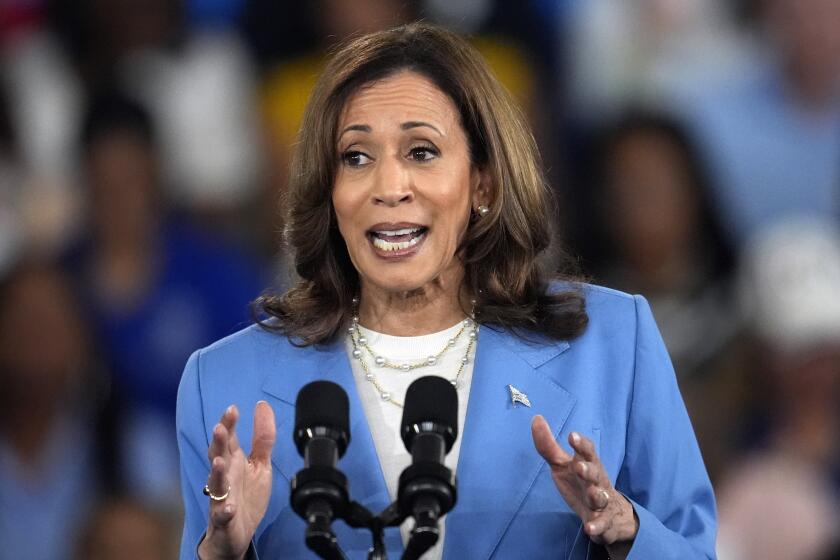Analyst Questions Gov.’s Budget
Gov. Arnold Schwarzenegger’s proposed budget would send state spending soaring while relying on a surge in real estate and corporate tax revenues that could quickly disappear, the Legislature’s chief fiscal analyst said Wednesday.
The state would spend more per person, even when adjusted for inflation, than ever before under the governor’s plan, said Legislative Analyst Elizabeth G. Hill -- about $5 billion more than projected revenue.
That could saddle lawmakers with multibillion-dollar deficits for years to come, Hill said.
A significant dip in real estate prices or a sharp rise in the cost of oil or natural gas, she said, could send the state’s finances into freefall once again.
“We think it is absolutely essential that we slow the spending increases,” Hill said.
“There are areas throughout the governor’s spending plan where he increases ongoing spending and, we think, signals that things are far better than in fact they are,” Hill said.
Her warning comes as the Republican governor is campaigning for a borrowing program that could expand the budget gap. Democrats seized on Hill’s report to demand that the governor scale back his proposed $68 billion in bond sales for transportation projects, levee repairs, new courts and jails, and other infrastructure work.
Hill warned that the revenue the budget plan was built on would come “from soaring profits and investment earnings, which are highly sensitive to changes in the economy.”
She also said the state cannot count on corporate tax revenues continuing to grow at the same rate as before. California companies reported an overall profit increase of more than 20% in each of the last two years -- boosted by large gains from oil companies, utilities, financial firms and the construction industry.
Assembly Speaker Fabian Nunez (D-Los Angeles) called Hill’s report “a wake-up call to the governor that we should take a more cautious approach on any bond proposal.” “We’re not out of the woods,” Nunez said.
He reiterated his previous call to suspend the launch of a $426-million after-school programs initiative that was championed by Schwarzenegger before he was governor.
Voters in 2002 approved the measure, which takes effect in fiscal 2006-07.
The Legislature would need approval from voters to suspend the measure.
GOP lawmakers said they were studying the issue. Senate Republican leader Dick Ackerman of Irvine said his caucus was looking into whether schools would be able to use all the money the initiative would provide, and whether the state could take back what the schools didn’t spend.
“We are going to see how much of that money can really be used,” he said.
But Ackerman said his caucus would recommend reductions in many other programs.
“Our game plan is going to be reduce spending,” he said.
Most of the new spending in the governor’s proposed budget comes at the behest of the Democrats who control the Legislature. They have resisted the governor’s efforts to pare state spending by billions of dollars since he took office in 2003.
In this election year, the governor appears to have chosen accommodation, with a spending plan that begins to meet their demands.
That includes a $1.3-billion boost to K-12 education -- over and above what the law requires -- that Democrats say should be even bigger. The governor also is proposing to cancel planned fee hikes at public colleges and universities that Democrats have criticized as mean-spirited.
And Schwarzenegger’s proposal to increase spending in Medi-Cal, California’s healthcare program for the poor, by 7.5% comes after efforts to cut the program were beaten back by Democrats.
Administration officials defended the governor’s plan as fiscally prudent. They said that despite the dour warnings, Hill’s revenue projections are even rosier than the administration’s. Hill’s report does project that revenues will be greater than what the governor forecasts.
Schwarzenegger spokesman Vince Sollitto said the $16-billion budget imbalance the governor inherited upon taking office has been markedly whittled down.
“Let’s give credit where credit is due,” he said.
Sollitto said the governor’s spending plan would continue to reduce the state’s budget gap while “increasing spending in certain key areas the public has identified as priorities.”
Scaling down Schwarzenegger’s borrowing proposal would be a mistake, Sollitto said.
“California is going to experience tremendous growth whether we do anything to plan for it or not,” he said. “We must invest strategically. The governor has a plan to do that which is affordable. Frankly, the state can’t afford not to go forward with it.”
More to Read
Get the L.A. Times Politics newsletter
Deeply reported insights into legislation, politics and policy from Sacramento, Washington and beyond. In your inbox three times per week.
You may occasionally receive promotional content from the Los Angeles Times.











